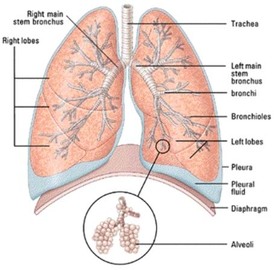How Breathe Well ~ Feel Better Benefits You
Of all the ways to reduce stress and improve overall health and well-being, mindfulness and breath work are among the oldest and most effective. They originated in ancient India and have been incorporated into yoga, martial arts, and many holistic practices. A little physiology helps explain why abdominal breathing is so powerful and so highly regarded by health practitioners.
The Lungs
The lungs are large organs ~ narrow at the top and wide at the bottom ~ that reach from the collarbone all the way down to the diaphragm. Air capacity and blood flow is least in the upper lobes and greatest in the lower lobes. You can see this clearly in the diagram to the right.
The object of respiration is not only to get enough air to breathe comfortably, but to oxygenate the maximum amount of blood. Oxygenation means to infuse the blood supply with oxygen. This is critical since metabolism takes place only when oxygen is drawn into the body's systems through the circulation of oxygenated blood. This process generates energy for cells to perform their vital functions and eliminate waste by-products. |
The Autonomic Nervous System
The autonomic nervous system has two parts:
- The Sympathetic, which controls the stress response, getting us ready for fight or flight when a crisis arises, and
- The Parasympathetic, which controls the relaxation response, once the emergency is over.
Shallow vs. Abdominal Breathing
When we breathe shallowly, we neither get enough air nor oxygenate enough blood for optimum health and creativity. Not only that, we may trigger Sympathetic activity when there is no emergency, creating stress and anxiety states and setting up a breeding ground for disease. For more information about this, click here.
When we breathe abdominally, we maximize metabolic potential, producing cell energy, stimulating the lymph system to detoxify the body of poisons, releasing endorphins (the body's natural pain killers), triggering Parasympathetic activity and correcting Sympathetic excesses.
When we breathe abdominally, we maximize metabolic potential, producing cell energy, stimulating the lymph system to detoxify the body of poisons, releasing endorphins (the body's natural pain killers), triggering Parasympathetic activity and correcting Sympathetic excesses.
If You're "Hyper" It's Time To Slow Down
_
If you are a "Type A" personality, or just feel stressed and sometimes like you're "running on empty," even a slight slowing down could literally save your life. Here's why:
Over-activity of the Sympathetic Nervous System, with its continuing secretion of stress hormones like adrenalin and cortisol, is responsible for many physical and emotional problems, including unnecessary stress and stress-related diseases and conditions such as:
If you are a "Type A" personality, or just feel stressed and sometimes like you're "running on empty," even a slight slowing down could literally save your life. Here's why:
Over-activity of the Sympathetic Nervous System, with its continuing secretion of stress hormones like adrenalin and cortisol, is responsible for many physical and emotional problems, including unnecessary stress and stress-related diseases and conditions such as:
- Hyperglycemia (elevated blood sugar) leading to Type 2 Diabetes
- Obesity
- Arteriosclerosis
- Cardiovascular problems
- Thyroid irregularities
- Anxiety states
- Sleep disturbances
- Immune system suppression
- Cognitive impairment
- Sexual dysfunction / loss of libido
Cortisol and weight gain
That "pear-shaped" look so common today has something to do with excess Cortisol production. Cortisol is a valuable hormone that stabilizes blood pressure and provides physical energy, especially quick energy for fight or flight. But excess Cortisol production due to chronic stress can also increase appetite. When that happens, Cortisol-related weight gain goes in the middle, not on the hips, and abdominal weight gain is connected to poor heart health. Just another really good reason you want to keep those stress levels as low as possible.
To find out what Breathe Well ~ Feel Better sessions are like, click here.
To find out what Breathe Well ~ Feel Better sessions are like, click here.
Steve Ross, MA, LMFT (CA)*
Mindful Counseling & Consulting
(520) 825-2009
[email protected]
http://www.breathingcoachtucson.com or
http://www.relaxandbreathe.net
* licensed in California
Mindful Counseling & Consulting
(520) 825-2009
[email protected]
http://www.breathingcoachtucson.com or
http://www.relaxandbreathe.net
* licensed in California

